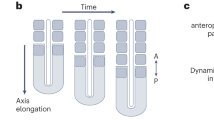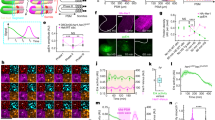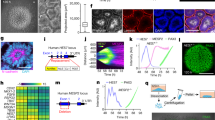Abstract
SEGMENTATION occurs in several animal phyla, and the cellular mechanisms generating this structural periodicity vary considerably1–4. In the leech, an annelid worm, segmental founder cells arise through a fixed cell lineage (Fig. 1), and come together in a longitudinally repeating array through a stereotyped pattern of morphogenesis5. In this paper we demonstrate that founder cells forced to differentiate in a foreign segmental environment give rise to their normal, segment-specific clones of neuronal descendants, even in segments in which those neuronal phenotypes would not normally be observed. These findings indicate that the individual founder cells possess segmental identity at or shortly after the time of their birth, and further suggest that such identities are established by a mechanism in which the parent stem cell 'counts' mitotic cycles.
This is a preview of subscription content, access via your institution
Access options
Subscribe to this journal
Receive 51 print issues and online access
$199.00 per year
only $3.90 per issue
Buy this article
- Purchase on Springer Link
- Instant access to full article PDF
Prices may be subject to local taxes which are calculated during checkout
Similar content being viewed by others
References
French, V., Development 104 Suppl., 3–16 (1988).
Kimmel, C. B., Sepich, D. S. & Trevarrow, B. Development 104 Suppl., 197–208 (1988).
Stern, C. D., Fraser, S. E., Keynes, R. J. & Primmett, D. R. N. Development 104 Suppl., 231–244 (1988).
Patel, N. et al. Cell 58, 955–968 (1989).
Weisblat, D. A. & Shankland, M. Phil. Trans. R. Soc. 312, 39–56 (1985).
Masinovsky, B., Kempf, S. C., Callaway, J. C. & Willows, A. O. D. J. comp. Neurol. 273, 500–512 (1988).
Shankland, M. & Martindale, M. Q. Devl Biol. 135, 431–448 (1989).
Martindale, M. Q. & Shankland, M. Devl Biol. 123, 85–96 (1990).
Blair, S. S., Martindale, M. Q. & Shankland, M. J. Neurosci. 10, 3183–3193 (1990).
Bissen, S. T. & Weisblat, D. A. J. Neurobiol. 18, 251–269 (1987).
Shankland, M. Nature 307, 541–543 (1984).
Martindale, M. Q. & Shankland, M. Devl Biol. 125, 290–300 (1988).
Loer, C. M., Jellies, J. & Kristan, W. B. J. Neurosci. 7, 2630–2638 (1987).
Baptista, C. A. & Macagno, E. R. J. Neurobiol. 19, 707–726 (1988).
Doe, C. Q. & Goodman, C. S. Devl Biol. 111, 206–219 (1985).
Akam, M. Development 101, 1–22 (1987).
Wysocka-Diller, J. W., Aisemberg, G. O., Baumgarten, M., Levine, M. & Macagno, E. R. Nature 341, 760–763 (1989).
Author information
Authors and Affiliations
Rights and permissions
About this article
Cite this article
Martindale, M., Shankland, M. Intrinsic segmental identity of segmental founder cells of the leech embryo. Nature 347, 672–674 (1990). https://doi.org/10.1038/347672a0
Received:
Accepted:
Issue Date:
DOI: https://doi.org/10.1038/347672a0
This article is cited by
Comments
By submitting a comment you agree to abide by our Terms and Community Guidelines. If you find something abusive or that does not comply with our terms or guidelines please flag it as inappropriate.



